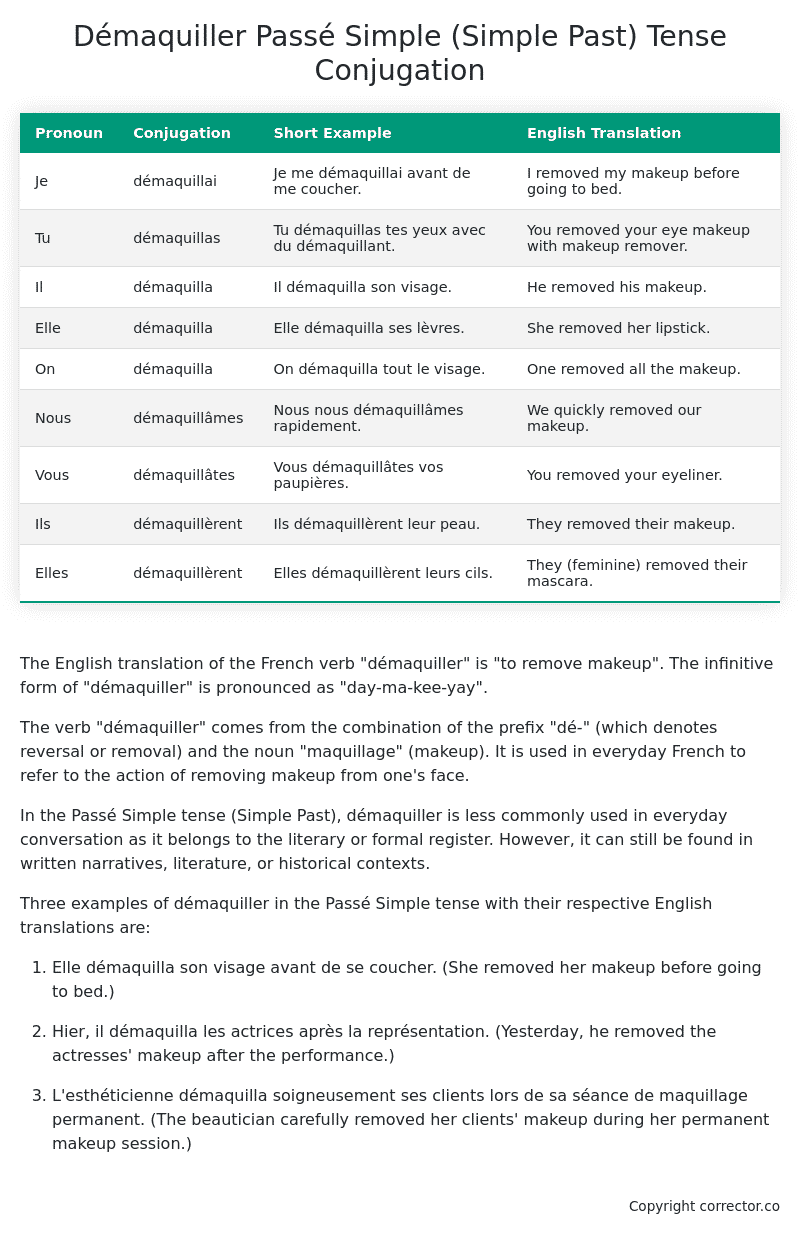Passé Simple (Simple Past) Tense Conjugation of the French Verb démaquiller
Introduction to the verb démaquiller
The English translation of the French verb “démaquiller” is “to remove makeup”. The infinitive form of “démaquiller” is pronounced as “day-ma-kee-yay”.
The verb “démaquiller” comes from the combination of the prefix “dé-” (which denotes reversal or removal) and the noun “maquillage” (makeup). It is used in everyday French to refer to the action of removing makeup from one’s face.
In the Passé Simple tense (Simple Past), démaquiller is less commonly used in everyday conversation as it belongs to the literary or formal register. However, it can still be found in written narratives, literature, or historical contexts.
Three examples of démaquiller in the Passé Simple tense with their respective English translations are:
-
Elle démaquilla son visage avant de se coucher.
(She removed her makeup before going to bed.) -
Hier, il démaquilla les actrices après la représentation.
(Yesterday, he removed the actresses’ makeup after the performance.) -
L’esthéticienne démaquilla soigneusement ses clients lors de sa séance de maquillage permanent.
(The beautician carefully removed her clients’ makeup during her permanent makeup session.)
Table of the Passé Simple (Simple Past) Tense Conjugation of démaquiller
| Pronoun | Conjugation | Short Example | English Translation |
|---|---|---|---|
| Je | démaquillai | Je me démaquillai avant de me coucher. | I removed my makeup before going to bed. |
| Tu | démaquillas | Tu démaquillas tes yeux avec du démaquillant. | You removed your eye makeup with makeup remover. |
| Il | démaquilla | Il démaquilla son visage. | He removed his makeup. |
| Elle | démaquilla | Elle démaquilla ses lèvres. | She removed her lipstick. |
| On | démaquilla | On démaquilla tout le visage. | One removed all the makeup. |
| Nous | démaquillâmes | Nous nous démaquillâmes rapidement. | We quickly removed our makeup. |
| Vous | démaquillâtes | Vous démaquillâtes vos paupières. | You removed your eyeliner. |
| Ils | démaquillèrent | Ils démaquillèrent leur peau. | They removed their makeup. |
| Elles | démaquillèrent | Elles démaquillèrent leurs cils. | They (feminine) removed their mascara. |
Other Conjugations for Démaquiller.
Le Present (Present Tense) Conjugation of the French Verb démaquiller
Imparfait (Imperfect) Tense Conjugation of the French Verb démaquiller
Passé Simple (Simple Past) Tense Conjugation of the French Verb démaquiller (You’re reading it right now!)
Passé Composé (Present Perfect) Tense Conjugation of the French Verb démaquiller
Futur Simple (Simple Future) Tense Conjugation of the French Verb démaquiller
Futur Proche (Near Future) Tense Conjugation of the French Verb démaquiller
Plus-que-parfait (Pluperfect) Tense Conjugation of the French Verb démaquiller
Passé Antérieur (Past Anterior) Tense Conjugation of the French Verb démaquiller
Futur Antérieur (Future Anterior) Tense Conjugation of the French Verb démaquiller
Subjonctif Présent (Subjunctive Present) Tense Conjugation of the French Verb démaquiller
Subjonctif Passé (Subjunctive Past) Tense Conjugation of the French Verb démaquiller
Subjonctif Imparfait (Subjunctive Imperfect) Tense Conjugation of the French Verb démaquiller
Conditionnel Présent (Conditional Present) Tense Conjugation of the French Verb démaquiller
Conditionnel Passé (Conditional Past) Tense Conjugation of the French Verb démaquiller
Conditionnel Passé II (Conditional Past II) Tense Conjugation of the French Verb démaquiller
L’impératif Présent (Imperative Present) Tense Conjugation of the French Verb démaquiller
L’impératif Passé (Imperative Past) Tense Conjugation of the French Verb démaquiller
L’infinitif Présent (Infinitive Present) Tense Conjugation of the French Verb démaquiller
L’infinitif Passé (Infinitive Past) Tense Conjugation of the French Verb démaquiller
Le Participe Présent (Present Participle) Tense Conjugation of the French Verb démaquiller
Le Participe Passé (Past Participle) Tense Conjugation of the French Verb démaquiller
Struggling with French verbs or the language in general? Why not use our free French Grammar Checker – no registration required!
Get a FREE Download Study Sheet of this Conjugation 🔥
Simply right click the image below, click “save image” and get your free reference for the démaquiller Passé Simple tense conjugation!

Démaquiller – About the French Passé Simple (Simple Past) Tense
Formation
Usage
Narration
Historical Context
Interactions with other tenses
Passé Composé
Imparfait
Conditional and Subjunctive
Summary
I hope you enjoyed this article on the verb démaquiller. Still in a learning mood? Check out another TOTALLY random French verb conjugation!


